上海新世纪版英语八年级下册Unit1Lesson1U1L1同步讲义教案
八年级英语下册 Unit 1 lesson 1 computer教学设计2 上海新世纪版
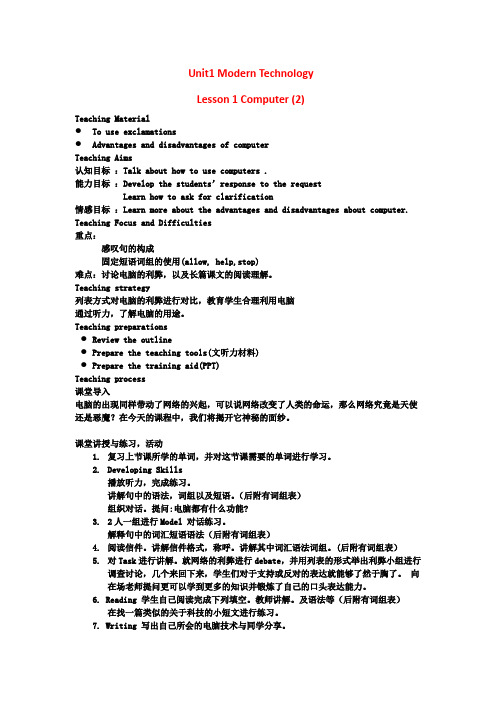
Unit1 Modern TechnologyLesson 1 Computer (2)Teaching Material●To use exclamations●Advantages and disadvantages of computerTeaching Aims认知目标:Talk about how to use computers .能力目标:Develop the students’response to the requestLearn how to ask for clarification情感目标:Learn more about the advantages and disadvantages about computer. Teaching Focus and Difficulties重点:感叹句的构成固定短语词组的使用(allow, help,stop)难点:讨论电脑的利弊,以及长篇课文的阅读理解。
Teaching strategy列表方式对电脑的利弊进行对比,教育学生合理利用电脑通过听力,了解电脑的用途。
Teaching preparations●Review the outline●Prepare the teaching tools(文听力材料)●Prepare the training aid(PPT)Teaching process课堂导入电脑的出现同样带动了网络的兴起,可以说网络改变了人类的命运,那么网络究竟是天使还是恶魔?在今天的课程中,我们将揭开它神秘的面纱。
课堂讲授与练习,活动1.复习上节课所学的单词,并对这节课需要的单词进行学习。
2.Developing Skills播放听力,完成练习。
讲解句中的语法,词组以及短语。
(后附有词组表)组织对话。
提问:电脑都有什么功能?3.2人一组进行Model 对话练习。
解释句中的词汇短语语法(后附有词组表)4.阅读信件。
新版-沪教版八年级英语下册Unit1 New words教案
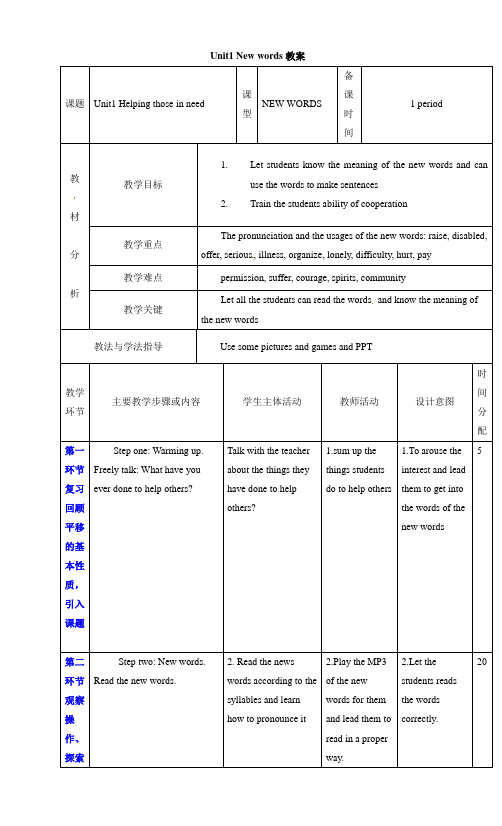
Step three: group work to remember the new words
Step four: Key wordse a competition
2. Read the news words according to the syllables and learn how to pronounce it
2.Train the students ability of cooperation
教学重点
The pronunciation and the usages of the new words: raise, disabled, offer, serious , illness, organize, lonely, difficulty, hurt, pay
4. Work in groups to learn the usage of the key words, pay attention to the following usages of the new words : raise, disabled, offer, serious, illness, organize, lonely, difficulty , hurt, pay, suffer
1.Dictation
2.correct the mistakes
Strengthen the remembering of the words and see if they can use the words correctly
课
堂
教
学
流
程
Read the new words --- Games and remember the new words ---- lea rn the usages of the new words -----Exercise----check how they master the new words
上海新世纪版英语八年级下册Unit2Lesson1U2L1同步讲义教案

学员编号:年级:课时数:学员姓名:辅导科目:英语学科教师:授课类型TUnit2(新世纪八下)基础知识梳理星级★★★教学目标1、使学生能够基本掌握新世纪8年级上册Unit2Lesson1中的基础词汇及重要句型;2、(建议2-5分钟)批注:图片内容为几个校园小编辑在讨论学校校报的事情,可以根据图片上的英语内容引出本节课内容。
(建议20-25分钟)What do you think of your school life? Do you have school newspaper?Let’s discuss the words!T同步-U2L1基础知识梳理1一、词汇Words1. chief a. most important, main 主要的,为首的n. 领袖;首领e. g. The lady sitting on the bottom stair is the chief editor. 坐在最下面的一级台阶上的女士是主编。
【知识拓展】chiefly adv. 主要地2. focus v.聚焦,调节焦距n.焦点,焦距【知识拓展】focus on = pay special attention to 着重在,集中在e. g. The discussion focused on three main problems.批注:这里要强调一下pay attention to 中的to为介词而不是不定式符号,还有其它的几个短语作为补充,如look forward to, devote… to …, contribute…to…3. suggest v. 建议e. g. I suggest a visit to Shanghai Museum. 我建议去参观上海博物馆。
I suggest seeing a movie. 我建议去看电影。
I suggest that we (should) make a plan first. 我建议我们首先做一个计划。
上外版新世纪英语八年级第二学期:Unit 1 Lesson 3 Period 1 教案设计
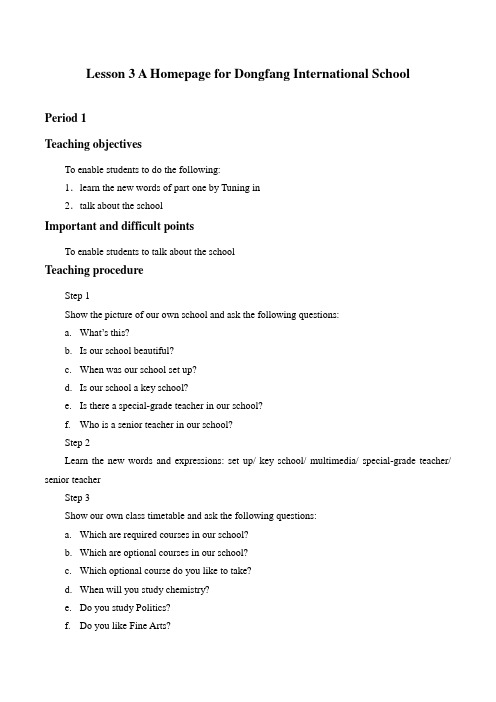
Lesson 3 A Homepage for Dongfang International SchoolPeriod 1Teaching objectivesTo enable students to do the following:1.learn the new words of part one by Tuning in2.talk about the schoolImportant and difficult pointsTo enable students to talk about the schoolTeaching procedureStep 1Show the picture of our own school and ask the following questions:a.What’s this?b.Is our school beautiful?c.When was our school set up?d.Is our school a key school?e.Is there a special-grade teacher in our school?f.Who is a senior teacher in our school?Step 2Learn the new words and expressions: set up/ key school/ multimedia/ special-grade teacher/ senior teacherStep 3Show our own class timetable and ask the following questions:a.Which are required courses in our school?b.Which are optional courses in our school?c.Which optional course do you like to take?d.When will you study chemistry?e.Do you study Politics?f.Do you like Fine Arts?g.Do you want to take part in Mathematics Olympics?Step 4Learn some more new words and expressions: required course, optional course, chemistry, politics, Fine Arts, Mathematic OlympicsStep 5Students look at the six pictures in the books and answer the questions below the pictures.Work in groups of four.。
牛津上海版八年级初二下册英语 第1讲-时态(1)-教案
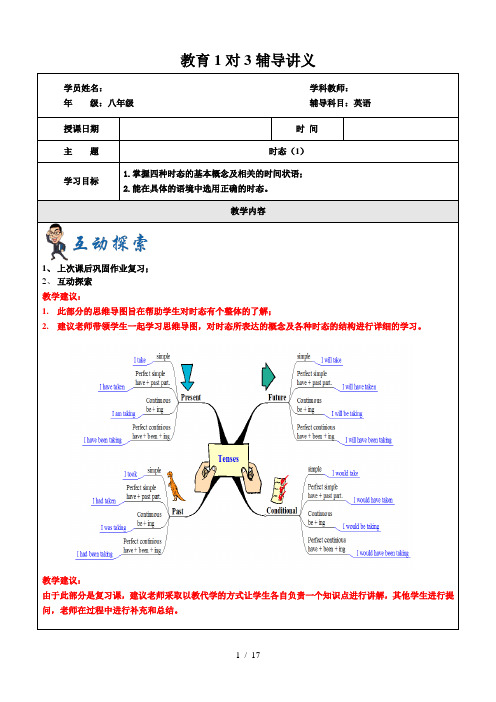
教育1对3辅导讲义学员姓名:学科教师:年级:八年级辅导科目:英语授课日期时间主题时态(1)学习目标1.掌握四种时态的基本概念及相关的时间状语;2.能在具体的语境中选用正确的时态。
教学内容1、上次课后巩固作业复习;2、互动探索教学建议:1.此部分的思维导图旨在帮助学生对时态有个整体的了解;2.建议老师带领学生一起学习思维导图,对时态所表达的概念及各种时态的结构进行详细的学习。
教学建议:由于此部分是复习课,建议老师采取以教代学的方式让学生各自负责一个知识点进行讲解,其他学生进行提问,老师在过程中进行补充和总结。
I.时态复习【知识梳理1】一般现在时1. 表示经常的或习惯性的动作,常与表示频度的副词连用。
常用的频度副词有: often, always, usually,sometimes, every day/month/year, once a week/month/year. 频度副词在句中通常放在行为动词之前,系动词、助动词之后。
People are often afraid of things they don't understand.I know my dad looks forward to his pay raise every year, and every year he is disappointed.This game was held once a year at the beginning, and now it is held twice a year ever since1957.2. 表示现在的状态或主语具备的性格、特征和能力等。
She is tall and with long blonde hair.My brother is good at maths while I do well in chemistry.3. 表示客观真理,客观存在,自然现象。
Light travels faster than sound.It’s known to all that the sun rises in the east and sets in the west.My mum once told me the earth travels around the sun and the moon travels around the earth.4. 在复合句中,当主句是一般将来时,时间或条件状语从句的谓语动词只能用一般现在时来表示将来要发生的动作。
上外版新世纪英语八年级第二学期Unit 1 Lesson 1 Our School Newspape
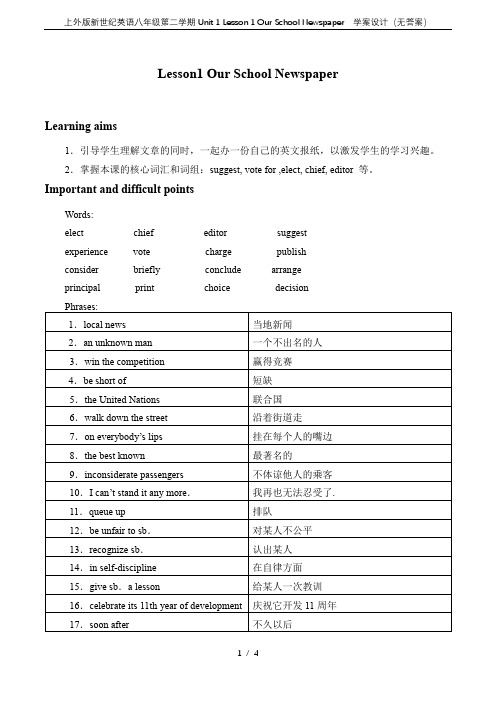
Lesson1 Our School NewspaperLearning aims1.引导学生理解文章的同时,一起办一份自己的英文报纸,以激发学生的学习兴趣。
2.掌握本课的核心词汇和词组:suggest, vote for ,elect, chief, editor 等。
Important and difficult pointsWords:elect chief editor suggestexperience vote charge publishconsider briefly conclude arrangeprincipal print choice decisionLearning process1.hold v.(held, held) 举行e.g.A debate will be held in the school hall tomorrow afternoon.明天下午学校礼堂将进行辩论。
2.elect v.选举election n.选举elector n.选民e.g.Reagan was elected as the 40th president of the United States.里根被选为美国第40任总统。
3.ought to aux.v.word that you to tell or ask sb.What is the right thing to do1) 用语表示义务或责任e.g.You ought to work harder than that.你应当努力地工作。
2) 用于表示合理可行或谨慎的态度e.g.You ought to wear a raincoat.你应该穿件雨衣。
3) 用于表示愿望e.g.She ought to finish by nest week.下星期她该完成任务了。
4.Consider v.think about carefully 考虑,认为e .g.We consider that the driver is not to blame.我认为着不是司机的过错。
上海牛津英语最新版八下unit1教案
Unit1period 1教学内容:Vocabulary语言知识目标:学会以下词汇:raise permission disabled teenager offer sufferillness organize express pain lonely friendship difficulty joy hurt (hurt, hurt)( courage spirits pay (paid, paid) community in need voluntary work ask permission suffer from raise one‘s spirits in order to语言技能目标:1、学会用音标记单词2、学会单词的构词法和分析单词的规律学习策略:1.游戏教学(大小声)2.竞赛(首字母抢答。
念中说英,念英说中)情感态度:学会用赏识的眼光去鼓励每位学生说英语。
Step1 : 复习英标Step2 :单词教授raise permission…Game : high and low./Simon said→silent I said →say quicklyListen to the tape .Step3 : 复习巩固Read togetherRead in groupSay English/Say ChineseStep 4: 拓展competition (首字母抢答)Step 5 : Homework for today1 、朗读单词2、抄写单词→预习课文(译P3)period 2教学内容:Reading教学目标:语言知识:初步了解篇章的结构语言技能:根据上下文语境猜测词义。
初步理解文章脉络了解三篇汇报学习策略:运用略读策略,了解大致内容情感态度:树立服务他人,保护弱者的意识。
教学重点:根据上下文语境猜测词义。
教学难点:通过初步阅读了解文章大意教学过程:step1:导入1.学生观察PPT展现的图片-爱心,展开议论。
初中英语沪教版八年级下册Unit1ReadingVoluntarywork教学设计
初中英语沪教版八年级下册Unit1ReadingVoluntarywork教学设计【名师授课教案】1教学目标1.语言知识目标:1)认读和理解 2)理解本篇课文的篇章结构2. 语言技能目标:1) 能够根据上下文语境猜测词义2) 通过进一步阅读掌握文章的关键信息。
3. 学习策略:能够运用略读策略,了解文章的大致内容,能够运用细读策略,找到文章的关键信息4. 情感目标: 树立服务他人、保护弱者的意识。
2学情分析所教班级的学生来自农村,思想淳朴,乐于助人,对志愿服务工作这个话题很感兴趣,但学生的英语基础比较薄弱,口语表达和写作能力不强,因此在英语阅读教学中进行分层要求。
并对学生加以鼓励和引导,完成阅读任务和记、进行知识迁移,渗透口语表达和写作的训练。
3教学重点难点教学重点:能够根据上下文语境猜测词义,通过进一步的阅读理解三篇汇报的内容,找出细节信息。
教学难点:在了解文章信息的基础上,发表自己的观点并陈述理由。
4教学过程4.1第一学时教学活动1【导入】Leading inWelcome the students and have a role play to get the students to think what should they do when they me et people in need and tell the students that doing voluntary work is very important and meaningful.2【活动】pre-reading1.Have a free talk to motivate the students about the idea of helping people in need, then Finish A Wha t do you know about ? “ Do you like helping others ?”“How do you feel when you give others’ a hand?”“What kind of people need our help?”“Where can we do voluntary work”“What kind of work can we do to help people in need?... “Do you know anything about voluntary work? Voluntary work something you do without being paid to help people in need . “Have you done any voluntary work before?”2. Brainstorm students to think “How can we do voluntary work?” quickly by using a mind map. Finish A。
上海新世纪版英语八年级下册期中复习讲义教案(精心整理)
学员编号: 年 级:八年级 课 时 数: 学员姓名: 辅导科目:英语 学科教师: 授课类型T(同步知识梳理)-8B 期中复习授课日期及时段教学内容新世纪版8B 期中复习词汇U1L1序号序号 英文英文 音标音标 词性词性 中文中文 1. native['ne ɪt ɪv]a. 本国的;本地的本国的;本地的 n. 本地人本地人 nation n. 国家国家national adj. 国家的;民族的国家的;民族的 international n. 国民国民 2. nearly ['n ɪəl ɪ] adv. 几乎,差不多几乎,差不多 nearadj. 附近的附近的adj. 靠近靠近3. communication [k əmjuːnɪ'ke ɪʃ(ə)n] n. 交流;交往;通讯交流;交往;通讯 communicatev. 交流交流 4. official [ə'f ɪʃ(ə)l] a. 官方的官方的 n.官员官员 office n. 办公室办公室 officern. 官员官员 5 widely ['wa ɪdl ɪ] adv. 广泛地广泛地 wide adj. 宽的宽的 widen v. 拓宽拓宽 widthn. 宽度宽度 6 addition [ə'd ɪʃən] n. 增加增加 add v. 增加增加 7 brief [briːf] a. 简短的简短的 brieflyadv. 简短地简短地 8 African ['æfr ɪk ən] a. 非洲的非洲的 African.非洲非洲U1L21 learner ['l ɜːn ə] n. 学习者学习者 learnv. 学习学习 2 skill [sk ɪl] n. 技能;技艺技能;技艺 skillfuladj. 熟练的熟练的 4perfect['p ɜːfɪkt]a.完美的;理想的完美的;理想的perfectly adv. 完美地完美地完美perfection n. 完美5 enjoyable [ɪn'dʒɔɪəbl] a. 有乐趣的,令人愉快的有乐趣的,令人愉快的enjoy v. 享受享受6 rewarding [rɪ'wɔːdɪŋ] a. 有益的;有偿的有益的;有偿的reward v. 奖励奖励报酬reward n. 报酬7 writer ['raɪtə] n. 作家作家rewrite v. 重写重写写作write v. 写作8 helpful ['helpfʊl] a. 有益的;有用的有益的;有用的help n. 帮助帮助help v. 帮助帮助无用的helpless adj. 无用的9 complain [kəm'pleɪn] a. 抱怨;发牢骚抱怨;发牢骚complaint n. 抱怨抱怨10 translate [træns'leɪt] v. 翻译翻译翻译者translator n. 翻译者翻译translation n. 翻译11 correctly [kə'rektlɪ] ad. 正确地正确地正确的correctly adj. 正确的修正;改正v. 修正;改正不正确的incorrect adj. 不正确的12 train [treɪn] v. 训练;培养;锻炼训练;培养;锻炼train n. 火车火车训练training n. 训练13 explain [ɪk'spleɪn] v. 解释;说明解释;说明解释explanation n. 解释U2L11 chief [tʃiːf] a. 主要的;为首的主要的;为首的n. 领袖;首领领袖;首领主要地chiefly adj. 主要地2 editor ['edɪtə] n. 编辑;编者编辑;编者编辑edit v. 编辑3 publish ['pʌblɪʃ] v. 出版;发行出版;发行publishment n. 发行发行出版商publisher n. 出版商出版业publishing n. 出版业出版的publishing adj. 出版的4 suggest [sə'dʒest] v. 建议;提议建议;提议suggestion n. 建议建议5 decision [dɪ'sɪʒən] n. 决定;决议决定;决议决定decide v. 决定6 reporter [rɪ'pɔːtə] n. 记者;报告人记者;报告人 report v. 报告报告n. 报告报告7 latest ['leɪtɪst] a. 最新的;最近的最新的;最近的 late adj. 晚的晚的late adv. 晚later adv. 后来后来8 advertisement [əd'vɜːtɪsmənt;,ædvɚ'taɪzmənt] n. 广告广告advertise v. 作广告作广告9 exchange v. 交换交换change v. 改变改变changeable adj. 多变的多变的10 responsibility n. 责任责任responsible adj. 负责的负责的response n. 回复回复respond v. 回答;回复回答;回复U2L21 renew [rɪ'njuː] v. 更新;续借更新;续借 new adj. 新的新的2 librarian [laɪ'breərɪən] n. 图书管理员图书管理员 library n. 图书馆图书馆3 recall [rɪ'kɔːl] v. 召回;回忆召回;回忆n. 回忆;记忆回忆;记忆 call v. 打电话打电话call n. 电话电话4 collection [kə'lekʃən] n. 收集;收藏收集;收藏 collect v. 收集;收藏收集;收藏collector n. 收藏家收藏家5 user ['juːzə] n. 使用者;用户使用者;用户 use n./ v. 使用使用useful adj. 有用的有用的usefully adv. 有用地有用地useless adj. 无用的无用的uselessly adv. 无用地无用地6 musician [m juː'zɪʃən] n. 音乐家音乐家music n. 音乐音乐musical adj. 音乐的音乐的musical n. 音乐剧音乐剧7 entertainment [entə'teɪnmənt] n. 娱乐;乐趣娱乐;乐趣 entertain v. 使娱乐使娱乐8. lover n. 爱好者爱好者love v. 热爱热爱U2L31 basic ['beɪsɪk] a. 基础的;基本的基础的;基本的基础;基地base n. 基础;基地为基础base v. 以…为基础2 chemistry ['kemɪstrɪ] n. 化学化学chemical adj. 化学的;化学的;化学物质chemical n. 化学物质化学家chemist n. 化学家3 social ['səʊʃəl] a. 社会的社会的社会society n. 社会4 science n. 科学科学科学家scientist n. 科学家5 achieve [ə'tʃiːv] v. 取得取得achievement n. 成就成就6 educational [edʒʊ'keɪʃənəl] a. 教育的;有教育意义的教育的;有教育意义的教育educate v. 教育教育education n. 教育教育家educator n. 教育家7 experienced [ɪk'spɪərɪənst] a 有经验的有经验的experience n. 经验经验experience v. 经历经历8 ability [ə'bɪlɪtɪ] n 能力;才干能力;才干有能力的able adj. 有能力的使能够enable v. 使能够unable adj. 没有能力的没有能力的9 required [rɪ'kwaɪəd] a 必须的;规定的必须的;规定的要求require v. 要求10 freely ['friːlɪ] adv. 自由地;自在地自由地;自在地free adj. 自由的自由的freedom n. 自由自由U3L11. heroic adj. 英雄的;英勇的英雄的;英勇的hero n. 英雄英雄2. director v. 导演;主任导演;主任直接的direct adj. 直接的导演;指导direct v. 导演;指导方向;指导direction n. 方向;指导3. animated adj. 栩栩如生的栩栩如生的animal n. 动物动物4. adventure n. 冒险冒险爱冒险的adventurous adj. 爱冒险的语法汇总:语法汇总:II. Important sentences 重难点句子 U1L11. English is one of the most important languages, and is used as an international language of communication.英语是最重要的英语是最重要的((语言语言))之一,并且是一种用来交流的国际语言。
八年级英语下册unit1第一课时优秀教案
Exploring Unit 1, Lesson 1 of the EighthGrade English Textbook: An ExemplaryLesson Plan**I. Objectives**Upon completion of this lesson, students will be able to:* Identify and pronounce new vocabulary related to the topic. * Comprehend the main idea and details of thelesson's reading passage. * Use the target language to discuss their opinions and experiences related to the topic. * Apply grammatical structures and language functions learned in previous units to communicate effectively.**II. Vocabulary Introduction**Introduce new vocabulary words related to the lesson's topic, such as "environment," "pollution," "conserve," and "sustainable." Have students practice pronouncing these words in pairs, focusing on correct pronunciation and intonation.**III. Reading Comprehension**Guide students through the reading passage, asking them to identify the main idea and key details. Encourage them to ask questions and clarify any unfamiliar vocabulary or concepts. Discuss the reading's implications for real-world environmental issues and how individuals can contribute to conservation efforts.**IV. Language Application**Engage students in a role-play activity where they take on the roles of environmental activists and policymakers. Have them discuss potential solutions to environmental problems, using the target language to express their opinions and justify their choices. This activity will help them apply the grammatical structures and language functions learned in previous units.**V. Conclusion and Homework**Summarize the main points covered in the lesson and强调the importance of environmental conservation. Assign homework that encourages students to research a specific environmental issue and prepare a short presentation or report on it for the next class.**探索八年级英语下册第一单元第一课时的优秀教案****一、教学目标**在完成本课时后,学生将能够:* 识别和发音与主题相关的新词汇。
- 1、下载文档前请自行甄别文档内容的完整性,平台不提供额外的编辑、内容补充、找答案等附加服务。
- 2、"仅部分预览"的文档,不可在线预览部分如存在完整性等问题,可反馈申请退款(可完整预览的文档不适用该条件!)。
- 3、如文档侵犯您的权益,请联系客服反馈,我们会尽快为您处理(人工客服工作时间:9:00-18:30)。
学员编号:年级:初二课时数:学员姓名:YYY 辅导科目:英语学科教师:授课类型T 同步-U1L1课文知识点梳理星级★★★教学目标1、通过梳理复习使学生能够基本熟悉本课的词汇及其用法;2、使学生掌握本课的重要句型。
(建议2-5分钟)1.Look at the different national flags in the picture above, and do you know which country each of them stands for?2.How many languages are spoken in each of them? What are they?3.So what language has the most speakers? That is our today’s topic-the international language.批注:本课的主题是关于国际语言的,那么首先要让学生对世界上比较常用的几种语言有所了解,导入部分通过一张图片让学生利用自己的常识去找出本课的主题—国际语言英语。
但是部分学生对于这一方面的知识可能比较生疏,尤其是女孩子,所以老师在引入部分一定要多鼓励自己的学生,适当的时候可以给与相关提示引导学生去发现问题。
在探讨完导入部分的三个问题之后,还要提问并引导学生想一想英语之所以成为国际语言的原因,之后正好引入本课的内容。
T同步-U1L1基础知识梳理1(建议20-25分钟)一、词汇Words1. official a.官方的,法定的n.政府官员e.g. The news is not official. 这个消息不是官方的。
e.g. They are government officials. 他们是政府官员。
批注:这里在引导学生这个单词的时候,要尤其注意后半部分-cial的写法,因为很多学生会把它与-cal混淆,比如medical 写出medicial(错误)。
一方面可以从读音方面引导,另外也可以帮助学生列举例子,如race(n.种族)--racial(a.种族的),finance(n.金融)--financial(a.金融的),office(n.办公室)--official(a.官方的)【知识拓展】区别official(n.政府官员)与officer(n.官员)official 常指政府或者行政官员officer 常指身着特定制服的官员,如军官—an army officer2.native a.本国的,本地的n.本国人,本地人e.g. Jack is native to Shanghai. = Jack is a native in Shanghai. Jack是土生土长的上海人。
【知识拓展】1.native language = mother tongue = first language母语2.nation n.国家(=country)national a. 国家的international a. 国际的e.g.Each nation has its own national flag. 每个国家都有自己的国旗。
all over the country = all over the nation 全国批注:在复习这个单词的时候主要引导学生词性转换时的词缀的变化,一些特殊的前后缀,如这里的-tion, -tive, -al等。
还可以让学生也发散思维,想出一些类似词缀的单词,如relative(但是要注意告诉学生不是所有的以-tive结尾的单词都是名词,如active),information,natural。
要注意引导学生把这些词缀与词性联系起来,平时在记单词的时候也可以注意这样来拆分记忆。
3. abroad ad.到国外;在国外反义词:at homee.g. More and more young people go abroad to study English. 越来越多的年轻人出国学习英语。
区别:abroad 与aboardabroad ad. 到国外;在国外词组:go abroad 出国aboard ad.在船(或飞机、车)上prep. 在(船、飞机、公共汽车、火车等)上拓展:broad a.宽阔的broaden v.拓宽,拓展e.g. Nowadays more and more students choose to study abroad to broaden their horizons(视野)。
批注:在这个环节的学习中要注意引导学生区分形近词的写法,尤其那些在单词记忆方面有障碍的学生,我们一定要提醒孩子们重视拼写中的细节,类似的形近词可以放在一起加强记忆。
同时,在broad词性转换的讲解过程中课适当加入词性转换规则的总结,最好能够让学生自己发现规律,如这里的a. + -en = v. 这里还可以引导学生列举其他例子,如wide (a.) widen(v.)等。
很多学生会在单词的拼写上出问题,但是我们在教授的过程中也要注意躲给到这样的孩子一些鼓励,及时对他们2的回答给予肯定,给他们信心。
4. communicat e v.交流,通讯communication n.交流,通讯词组拓展:communicate with sb. = keep in touch with sb. 与某人交流e.g. In order to communicate better with foreigners, we had better learn English hard.为了更好地与外国人交流,我们最好认真学习英语。
批注:这个知识点中也要注意词性转换的方法—词尾e直接改为ion.另外,需要教会学生熟练运用上面的词组,这两个词组的转换可能出现在考试中的单选或者句型转换题型当中,所以一定要引起重视,最好能够带着学生一起在课堂上完成词组的记忆。
二、重要句型Important Sentences structures1. English is one of the most important languages, and is used as an international language of communication.英语是最重要的(语言)之一,并且是一种用来交流的国际语言。
be used as…被当作;被用作……e.g. The building is currently used as a warehouse.这所房子目前用作仓库。
拓展:be used to do sth. 被用来做…be used to doing sth. 习惯于做…used to do sth. 获取常常做…批注:这一部分主要注重词组的学习与辨析,在这里可以先以考察的方式让学生回顾是否还记得这几个形近粗组各自的意思。
然后分开逐一攻破。
可以把be used as 和be used to do sth. 放在一起记忆,as 本身即是作为的意思,而t不定式to do 则可以表示目的,为了做…,再结合be used 被动语态的结构进行记忆。
尤其注意的是be used to doing sth. 中的to不再是构成不定式的部分,而是变成了一个介词,所以后接只能是动名词或者名词,正如我们之前学习过的look forward to doing 是一样的。
至于used to do sth.这个词组除了它的意思以外,还要告诉学生碰到它的反义疑问句应该怎么做,即这里的used,我们既可以理解为动词的过去式,那么就要借助助动词did或者didn’t,也可以理解为助动词,那么则用usedn’t即可。
2. A lot more people in other countries learn English at school.许多其他国家的人在学习英语。
a lot (1)非常,十分(=very much)e.g. Thanks a lot. = Thanks very much. 非常感谢。
(2)…得多(常用于修饰比较级)e.g. I feel a lot beeter now. 我现在感觉好多了。
拓展:修饰比较级的有a lot, a bit, a little, far, much, even, still(3)a lot of 很多,大量(既可以修饰可数名词也可以修饰不可数名词)拓展:只能修饰可数名词:many, few, a few, a great number of只能修饰不可数名词:much,little, a little, a great deal of, a large amount of两者都可以修饰:some, a lot of, lots of, plenty of批注:在教给学生修饰比较级的知识点的时候,可以利用口诀“一只小肥猫饿死”,分别借助汉语拼音的首字母引出相应的单词。
具体如下:一只小(三个以a 开头的词组)肥(以f开头的far)猫(以m开头的much ★不是3more哦★) 饿(以e开头的even)死(以s开头的still)修饰可数名词、不可数名词以及两者皆可修饰的知识点时,一般的学生只是对于蓝色的四个词组不太熟悉,所以我们再教学中可以着重梳理这四个词组的用法,可以结合具体的例句来练习。
3.French-speaking people live not only in France but also in Canada and African countries.说法语的人不仅居住在法国,而且在加拿大和非洲国家也有定居。
not only…but also…不仅……而且……;除了……还……not only…but also…如果连接两个成分时,不用倒装;连接句子时,前面的句子要用倒装。
e.g. Not only Mike but also his brother can swim well.不仅迈克而且他的弟弟游泳游得很好。
Not only is he busy,but also I have a lot of work tO do.不仅他忙,而且我也有很多工作要做。
拓展:就近原则:not only...but also, either...or, neither...nor, there be句型就远原则:as well as, together with, along with, with批注:这里着重强调就近和就远原则,首先要向学生解释清楚这里的就近、就远具体指的是所要填入的谓语动词与哪一个主语更近或者更远。
另外,有些学生会将both..and 混入就近原则,同样是表示两者都,但是一定要区分开它与not only..but also,前者的谓语动词只能用复数,不受主语的影响。
